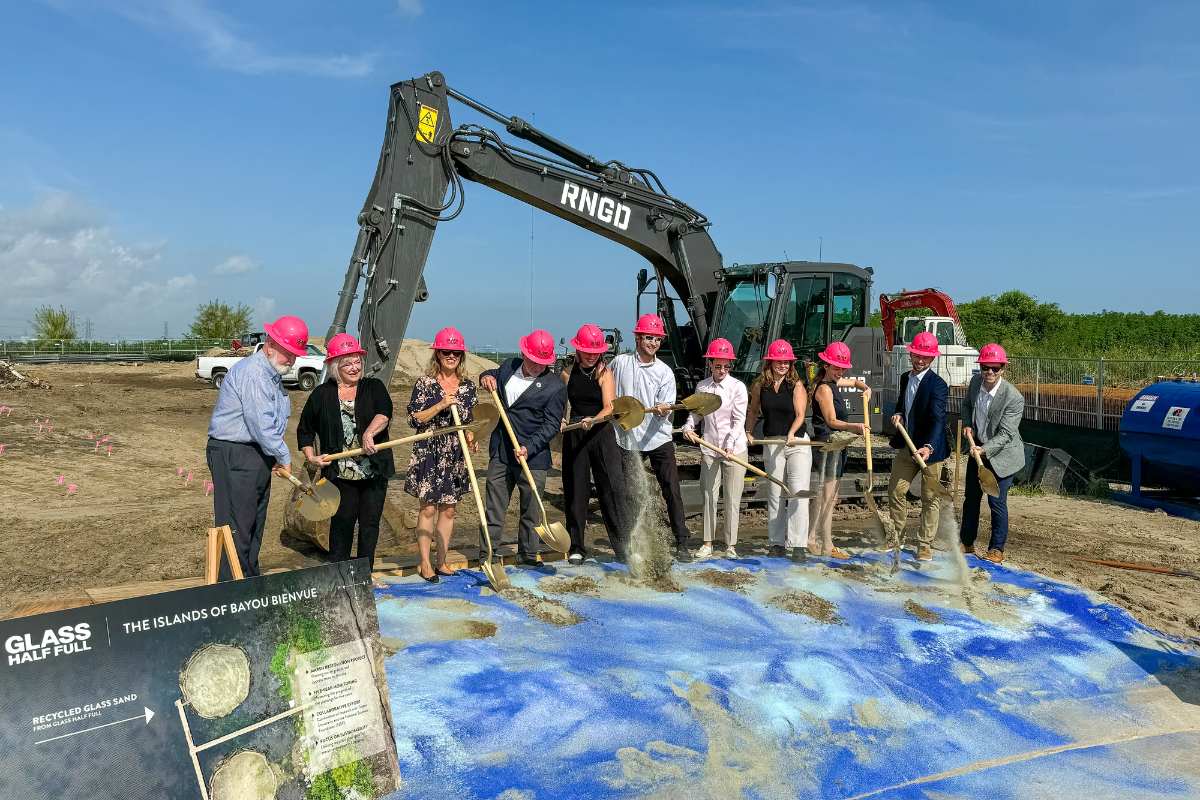
Glass Half Full broke ground on their new facility, which will give the grassroots glass recycling company the capacity to create cullet as well as sand. | Courtesy of Glass Half Full
Glass Half Full leaders knew the company needed a bigger facility as soon as they opened the first one. Now, as the concrete slab for a new space is poured on the coast of Louisiana, cofounder and CEO Franziska Trautmann is already imagining the three acres filled with glass.
“We pretty much said go big and fill the plant with glass,” Trautmann told Resource Recycling, explaining that “ever since we started, it’s always felt like there was more demand for glass recycling than we’ve been able to handle. It’s always felt like we were piling up glass and struggling to process it and satisfy everyone.”
The new facility, located on a capped landfill in Chalmette, Louisiana, is sited on three acres of land and will be indoor-outdoor, she said. It should be operational by early 2025, and at full capacity could handle up to 150 tons of glass per day.
That’s needed capacity, because Trautmann’s vision is to handle all the glass within a 200-mile radius of New Orleans.
“There’s always been a huge lack of glass recycling in the region, and so we’ve always felt like the only way to go is up,” she said. “Louisiana and Mississippi, especially, consistently are toward the bottom of the list in terms of recycling as a state, and so we’re trying to just reach out to these communities. We just launched in Mobile, Alabama. We’re starting to expand where we can collect from, so we can just fill this plant with glass and get as much recycled as possible.”
Growing out of modest roots
Glass Half Full started in a backyard in 2020, with Trautmann and co-founder Max Steitz looking to recycle glass bottles from their friends and themselves. However, word got out, demand exploded, and soon the business was moving into a 40,000-square-foot facility. But in 2022, the founders saw a need to scale up.
“We started fundraising at least a year and half ago seriously, trying to raise some funds,” Trautmann said. “It was definitely a long time coming and finally in April or so, all of the pieces started fitting together.”
That included a seed funding round that raised $6.5 million, led by Benson Capital Partners and supported by Momentum Fund and Innovation Catalyst. The Meraux Foundation and AMCREF Community Capital also supported the expansion.
“It’s exciting and also kind of terrifying,” Trautmann said. “It feels like it’s been a long time coming and at the same time like just yesterday we were like, should we build our own facility?”
Back in 2022, Glass Half Full had five employees and 1,000 volunteers collecting 100,000 pounds of glass a month through neighborhood pickup and drop-off programs, grinding it into sand to be used in sandbags and coastal restoration pilot projects.
Now, there are more than 20 employees, as well as a fleet of trucks and vans to do commercial and residential collection. The new facility will have enough space to allow Glass Half Full to produce cullet, as well as satisfy the growing demand from restoration projects and for sandbags.
A local environmental benefit
The sand the company produces completed baseline safety testing for Louisiana marsh restoration, and has now moved on to demonstration projects – one of which is right next door to the new facility, Trautmann said.
There, two new islands have been built and planted with marsh grass. One island is made of sand from Glass Half Full and the other from sediment dredged from the Mississippi River. Over the next five years, researchers will monitor both islands to see if there are any differences between the two.
The Coalition to Restore Coastal Louisiana and the Pointe au Chien Indian Tribe have also received sand for restoration projects. Next up are dune and beach restoration projects, in and out of the state, Trautmann added, and there is governmental interest from as far away as Delaware.
“It’s definitely been a really interesting part of it all, to use it locally to protect the coast,” Trautmann said.
Commercial recycling and drop-off bring in the most volume, Trautmann said, but the company is also expanding its services into Jefferson Parish, St. Bernard, Slidell, Mandeville, Covington and Baton Rouge in Louisiana, as well as Birmingham, Alabama, and Bay St. Louis, Mississippi.
In Jefferson Parish, close to New Orleans, Glass Half Full is also experimenting with single-stream recycling collection, which goes to a local MRF. But glass is still the focus, Trautmann said.
“It feels like there’s a lot of glass out there just going straight to landfill,” Trautmann said. “There’s so much potential in how much we can grow glass recycling across the U.S. and especially for us, we’re pretty focused on the south and southwest, Louisiana, Mississippi, Alabama, Florida. … We want to ideally be in those states collecting millions and millions of bottles and turning them into a useful resource.”